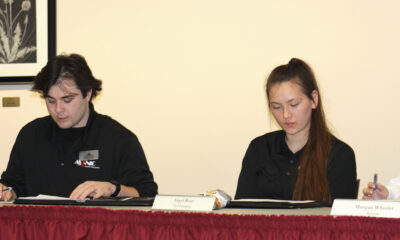Uncategorized
Communication Breakdown: Campus food policy creates controversy
The following article is the first half of a two-part installment of the Sentinel’s investigation into the campus’ controversial food policy.
“North Idaho College Food Services offers many catering options for your events. Outside food is not permitted on campus as part of a scheduled event or activity. All catering must be requested from NIC food service through the ACTIVITIES REQUEST FORM. Exceptions SUAB Policy #5 allows for exceptions to be made for events where specialty, ethnic, or international cuisine that is not commonly produced by Dining Service will be sold as a fundraiser. Request for exceptions to the policy can be requested in writing 14 days in advance, after completing an ACTIVITIES REQUEST FORM.” This small paragraph in a 13-page club handbook is the center of what has erupted into a several months long controversy pitting students against administrative policy and leaving administrators struggling to find a policy everyone knows but nobody has written down.
But in order to understand a complicated subject, you have to go back to the beginning.
“Originally it started because we wanted to bring in outside food,” said Luke Kilcup, 19, former chair of NIC‘s College Republicans.
After his club was offered free pizza for a year from a local Domino’s Pizza last fall, Kilcup said they were denied a request asking to be considered exempt from the policy under these special conditions.
Kilcup said when he felt like his attempts to find a solution were met with continued resistance, he decided to take matters into his own hands.
“It was kind of ridiculous, we felt like we couldn’t get anything done, especially through food services, and we got shut down so went sent an email around,” Kilcup said.
The email, which alleged that “[sic] to buy 15 pizzas, 4 gallons of punch, 1 gallon of coffee, and 3 dozen cookies through NIC’s food services it would cost $229” argued that with the donated pizzas and extra expenses “lightly” researched, $41 would be the sole cost for the fledgling club to host the Mayoral Candidates Forum on campus.
While Kilcup acknowledged that widely spread message seemed to upset some people who felt his club was not properly following procedure to lodge their complaints formally, he found other ASNIC clubs responded to his decision to start a petition with enthusiasm.
“[The clubs] don’t always get along, but they agree on this subject,” Kilcup said. “We had seven or eight clubs signed.”
Soon, his club was even addressing the campus’ board of trustees about the subject, but Kilcup said, that is where things started to unravel.
“Linda Michaels [Dean of Students] invited me to sit down and talk with her. Heather [Erikson] kind of shut it down,” Kilcup said. “A lot of people didn’t respond at all.”
Kilcup said Erikson, NIC’s assistant director of student development, wanted the clubs to work through more traditional channels to make progress.
“We should’ve joined a student union advisory board and tried to go through [it that way] but that would have been a semester long process,” Kilcup said. “I think Heather wanted it handled in the appropriate way but it never seemed to be a priority.”
Before long, any momentum the clubs had diminished and the policy remained in the club’s handbook intact.
Although he’s set to graduate this spring, Kilcup said he still worries about the policy he fears stifles student clubs economically.
“It’s costing the clubs,” Kilcup said. “To see [the clubs] being hurt, and students not being able to do what they need to do or not to the extent that they could have, I think that would upset anyone. It’s a monopoly on the food system and it’s just unfair to the students.”
For a time it had appeared the petition had all but died on the vine, but would only take a few short months for the issue to come roaring back into focus when another club would run into problems with the same policy.
After finding the food purchased for his new club’s event unpalatable and prohibitively expensive, T.J. Gossard, 21, President of NIC’s American Indian Student Alliance, Phi Theta Kappa and Film Club, decided to start investigating how and why the club’s food policy came into being.
Gossard said when he was digging for the policy’s origin he was surprised to find that while many administrator’s claimed it stemmed from an over arching departmental rule on campus, nobody could find such a rule anywhere.
“I think where the fault in all of this is that we don’t have an easy defined, easy to understand clear policy and process for what the policy is and how to petition for an exception for that,” said Graydon Stanley, vice president for student services. “In my past, we have had a form. If they wanted the food from somewhere else, they would have met with the food service. The food service could sign off and say fine. If they didn’t get the approval, they would appeal that to me.”
Under the full policy as explained by Stanley, NIC’s College Republican’s would have actually been eligible for exemption due to the free nature of the pizza that was to be provided.
But with no real policy actually on paper, clubs have found themselves receiving very different answers from very different sources, creating confusion, delay and frustration between students and the various administrators on campus trying to help them navigate through what can rapidly devolve into a bureaucratic knot.
Although students and administrators may disagree on the contents of the policy, for the first time the lack of clarity and procedure is being addressed and Stanley said by the beginning of fall semester students, administrators and faculty will be able to find and understand a revised version of the policy which will be documented, perhaps fully for the first time, over summer.
Although Gossard said his part in a newly food policy petition will continue through official channels due to remaining concerns with its content, he said he remains cautiously optimistic that this first step means there will be a more successful dialogue and a final resolution to club’s woes.
“Even the administrators I’ve spoken with acknowledge that the kitchen’s policy and governance is not in a good state and wish to see change,”Gossard said. “It hasn’t been a fun experience, but it’s good to know that change is coming.”
Up next: Students and administrators explain why they feel the current policy should change or remain.
Christina Villagomez is the current Managing Editor and former News Editor at the Sentinel. Described by a previous employer as being a jack-of-all-trades-writer and a bit of a spark-plug, Christina enjoys writing hard news stories when she's not attending board of trustee meetings in her spare time. Christina was previously a staff writer at the Panhandle Sun, and is the three-time winner of the Most Cheerful Award at her old elementary school as well as several Idaho Press Club Awards and a Region Ten Mark of Excellence Award from The Society of Professional Journalists for her news writing.








